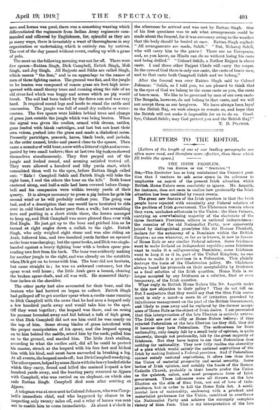LETTERS TO THE EDrroR.
[Letters of the lengths of one of our leading paragraphs are often more read, and therefore snore effective, than those which fill treble the space..1 THE IRISH PROBLEM.
[To Tall EDITOR- OP IMP " SPECTATOR."] 8rtuTher..Speet star hae so long maintained the Unionist posi- tion that I venture to ask some space. iu its columns to emphasize an aspect of the present Irish situation which Britials,Home.Rulers seem resolutely to ignore. Mr. Asquith, for instance, does not seem to realize how. profoundly the Irish situation has been modified by regent events..
The-great new feature of the Irish question. is Oat the Irish people have, rejected with unanimity any. Federal solution of the problem of Irish government. The Ulstermen remain whore they, were, unshalumaelherente to the Union: the Sinn Feiners, carrying, an overwhelming majority of the electorate of the three Southern Provinces, adhere to national independence: the remains of the old. Nationalist Party, now apparently joined by distinguished proselytes like Sir Horatio Plunkett, declare for the autonomy of 4 Dominion within the British Empire: no one whatever, so far as ielnown, is now in favour oh Item. Rule or any. similar Federal scheme. Some Irishmen want to make Ireland an independent republic; some Irishmen want to snake it a self-governing Dominion; some Irishmen want to keep it as it is, part of the United Kingdom: no one wishes to make it a province In a Federation. This plainly destroys the basis. of the Gladstonian policy. Mr. Gladstone always based his proposals on their acceptability by Irishmen as a final solution of the Irish question. Home Rule is no longer accepted by any Irishman as a solution, final or even temporary,,af the Irish question.
What-reply do British Homo Rulers like Mr: Asquith make to this now objection to their policy They do not tell us. But Poonjeatere that they would-say that the Sinn Fein move- ment is only a mood"-a mere fit of' irritation provoked by injudicious management on the part of the-British Government-, and• likely to pass away and base/placed- by the-former accept- ance otELome Itulerea the object. of Irish desire. I am. persuaded that this interpretation of the late Election is entirely. untrue. The- Bleb are: net so silly as Home Rulers believe : if they rejected Federalism at the late-Eleetion (as-they did), they did it bemuse, they hate Federalism. The. enthusiasm for Irish nationality, onlydeeply felt by a small body of:opinion, is quite sincerely, though. not profoundly, felt by the greet majority of Irishman. Buts they have begun to see that. Federalism does needier, for natiomality. They now fully realize. the absurdity of a.. plan which would, satistyrthe national aspirations of the Irish by making Ireland a Federal province. And if Federalism cannot sattsfY national aspirations, it oilers lees. than does the Union of material prosperity and social security. Some bodies of Irish opinion. and notably the heads of the Roman Cathelto Church, probably in their hearts prefer the Union as. the quieted. safest, and most: prosperous form of Irish government. Thew induenoesgy were all thrown at the. lute Election on the side of Sinn rein, not out of love of Judo- pendencie, but: in order to kill the lime Role Act. A senti- mental, love of nationality, coalescing with a prudent: and materialist preference. for the: Union, combined to overthrow the. Nationalist Party and achieve the strangely complete victory of Sinn Fein. This is my interpretation of the late
Election, and I believe the only one that has been put forward which doss not assume the lrieh to be raving lunatics.
If I am eight, the majority of Irishmen, while making inde- pendence _their first preference, world make the Union their second preference, and put Federal Horne Rule third on the 114. if this is their verdict, plainly we must give up Home lisle: no one would suggest imposing it on Ireland against the will of the Irish. Instead I would require the Irish to frame their own plan in detail as a Parliamentary Bill and submit it to Parliament. For that purpose I would net up four Pro- vincial Councils for the four Provinces in Ireland, to be elected :recording to Proportional Representation. These Councils might sit together and act jointly, if they pleased, but would net be obliged to do so. This would doubtless result in the thief( Southern Councils acting together, and the Council for Plater acting separately. It would then be left to the Councils, acting jointly or separately, to present to Parliament whatever plan for Irish government they prefer; and, in order to prevent the plan being shelved, it would be provided that a Bill brought in at the request of a Provincial Council should be placed in the charge of the Chairman of Ways and Means, and should take precedence of all other Parliamentary business on any day on which it was net down for discussion in the House of Commons. By this means the Irish would be forced them- selves to face all the difficulties of Irish government, and to present detailed proposals to Parliament, which Parliament would not he allowed to neglect. That this would immediately provide a solution of the Irish question I do not suppose; but it would do two things. It would help to educate the Irish people in political wisdom, and it would show every one in Ireland, in Great Britain, and in the world that we were in good faith trying our best to satisfy the discontents of Irishmen.



































 Previous page
Previous page